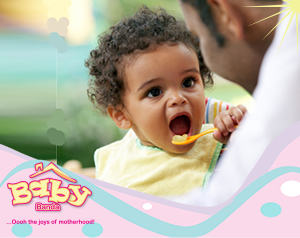Dietary salt is an inorganic compound consisting of sodium and chloride ions. It is found naturally in many foods or added to foods because of its preservative and flavoring characteristics.
For infants, the ingestion of foods high in sodium can lead to death because the kidneys have not developed fully. That is another reason why you should not introduce solids until six months of age.
How much salt should your baby consume per day?
- 0 to 12 months- less than 1 gram
- 1 to 3 years-2 grams
- 4-6 years-3 grams
- 7 to 10 years-5 grams
- Above 11 years-6 grams
Ways to control salt for your baby
- Continue to offer breast milk as it naturally contains a small amount of salt.
- Avoid cow’s milk until the little one is 12 months.
- Your child doesn’t need salt. However, you can use low salt food products in cooking or add minimal salt, especially to family meals.
- Use herbs and spices to flavor the baby’s food instead of salt. However, talk to a health specialist to know what is right for your baby.
- Understand food labels and choose food packages with “no added salt.” Foods low in salt contain less than 120 mg per 100g, foods moderate in salt contain 120-600 mg per 100g, and foods high in salt contain more than 600mg per 100g.
- Avoid foods that have a toxic amount of salt like:
- Biscuits
- Pizza
- Ready-made foods from hotels and supermarkets
- Bacon, sausages, and smokies
- Salted crisps and soups.
- Instead, go for choices like:
- Fruits and vegetables
- Eggs
- Lean chicken
- Lentils
- Rice
- Ugali
- Wimbi
How do you know your child has had too much salt?
- Since sodium causes dehydration, your child will keep asking for water. So, unless the young one is extremely active or the weather is too hot, consider reducing his/her salt intake.
- High blood pressure. Yes, your three-year-old can have hypertension due to salt poisoning. Therefore, make sure that medics check your child’s blood pressure each time you visit your pediatrician.
- The urine is too yellow with a pungent smell.
- If your child has a craving for processed salty snacks
- If you’re breastfeeding and you overeat salt.
- Obesity without sugar and processed fats
Spices you can use in place of salt
- Thyme is rich in vitamin C, fiber, iron, and copper. You can put it in potatoes, pumpkin and meat dishes.
- Oregano is rich in antioxidants and can help fight bacterial infections.
- Nutmeg and turmeric.
- Ground cumin and fennel seeds
- Coriander
- Cinnamon
Take-home
Avoid giving salt to your baby in the first year. The little one does not have a sense of taste, so resist the temptation to flavor his food. Your breastmilk or formula contains all the salt the child needs. Salt poisoning can kill your child. However, you can use other alternatives to season food. Remember to use minimal spices in your baby’s food.













